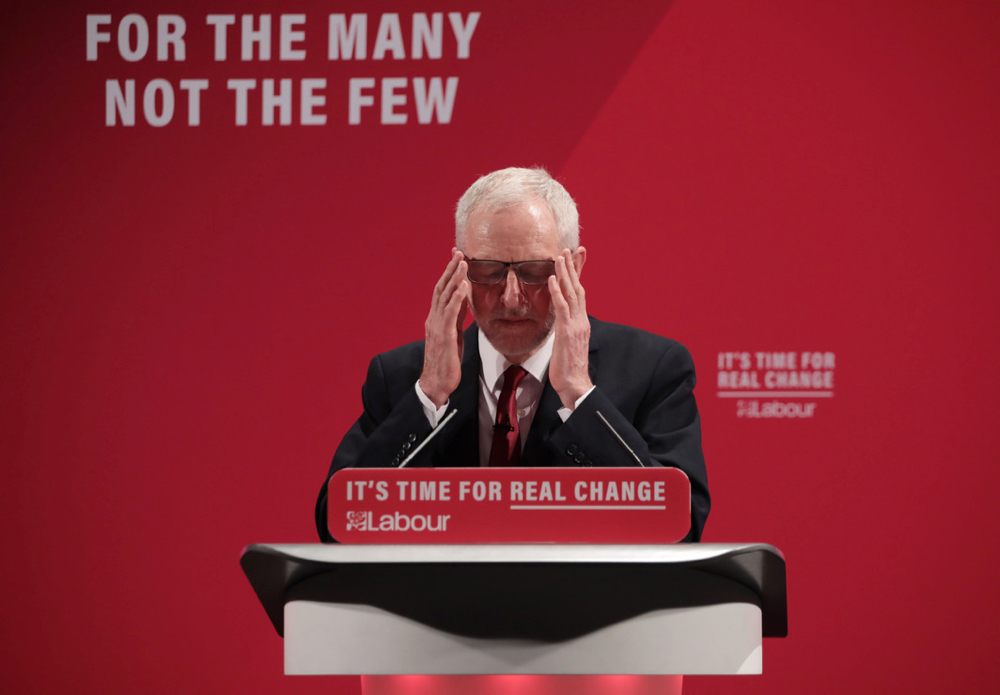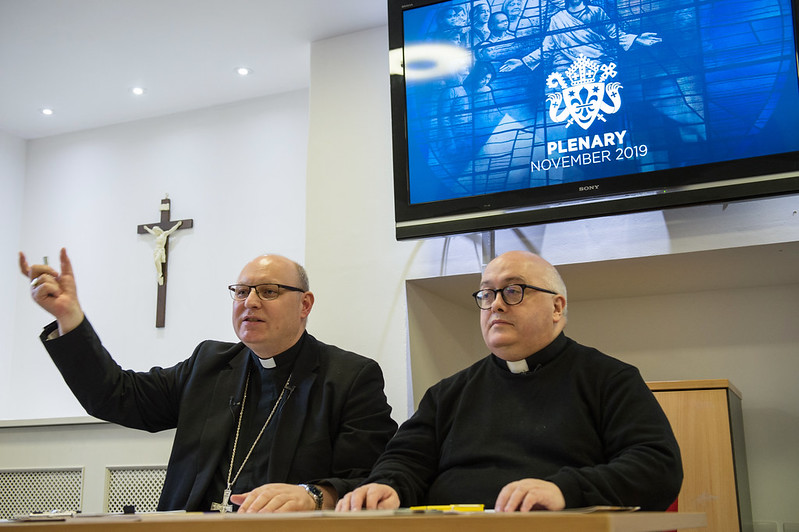I have rarely seen an official Catholic document so poorly expressed as the pre-election statement issued by the Bishops' Conference of England and Wales after their recent plenary meeting. They did not manage, you could say, to rise to the occasion.
See it here and judge for yourself.
They state: "We urge all in public life to recognise that telling the truth, not making vindictive and abusive comments or unattainable promises, are essential." How true, how true, but I would have thought courage could have been mentioned somewhere as well. Not so. It is as neutral as Jeremy Corbyn on the subject of Brexit – the most important question facing Britain for a generation. Reluctance to upset a few Catholic voters should be the last thing on their minds when bishops address such issues. They don't after all, have constituents to please. Platitudes are not an adequate substitute for leadership.
As well as a bit of bottle, the bishops badly needed a good sub-editor – even a poor one would have sufficed – to sort out sentences such as: "The innate dignity of every human being; defending both the child in the womb, the good of the mother and an understanding of the immeasurable good of a child not yet born?" Why the semi-colon? A colon would have been correct. A semi-colon there is virtually illiterate, or, to be kind, a misprint.
More to the point, why the question mark? This is one of the points Catholics should consider asking their Parliamentary candidates about, say the bishops, but they are assertions, not questions. And why the otiose repetition in "defending both the child in the womb" and "an understanding of the immeasurable good of a child not yet born"? "The child in the womb" and "the child not yet born" are surely the same thing. And why is the good of the child in the womb "immeasurable" but not the good of the mother? Why did nobody bother to check this document before it was published?
This has all the marks of a chore to be done rather than a visionary and prophetic expression of their apostolic mission. The gold standard here was set in 1996 when the bishops of England and Wales produced their 13,000-word statement, The Common Good and the Catholic Church's Social Teaching. It was not technically a statement of the Bishops' Conference as such, in order to get round the ruling by the then Cardinal Ratzinger that bishops' conferences had no status as part of the magisterium, while unanimous statements fully endorsed by individual bishops still did. So every word of every sentence – indeed every semi-colon and question mark – had to be agreed by every bishop, albeit after some discussion and negotiation between them. I know this because I was hired to assist the committee of bishops commissioned to produce an initial draft, and I had to do most of the donkey work. It was like being a leader writer with about 40 editors to satisfy.
What they wanted to say about abortion bears repetition.
"The current tendency in social teaching, under the influence of the Second Vatican Council and the present Pope, is to integrate it with the rest of the Church's moral teaching. The Council included as evils which it described as 'infamies indeed' such practices as 'subhuman living conditions, arbitrary imprisonment, deportation, slavery... disgraceful working conditions, where men are treated as mere tools for profit rather than as free and responsible persons' in exactly the same list as 'murder, genocide, abortion and euthanasia'. Similarly, Pope John Paul II has placed the issue of abortion within the context of social injustice, especially the poor economic circumstances of many women and their families. This makes it clearer that situations of personal sin are often related to situations of structural sin."
And later, it returned to the issue: "Taking into account all these considerations, we would nevertheless remind Catholic electors of the alarming extent to which Britain has become a particular example of what the present Pope called a 'culture of death'. In the three decades since the passage of the Abortion Act, human life has been devalued to the extent where abortion is widely regarded as a remedy for any social or personal difficulties. We have to raise our voices in protest against all destruction of human life in the womb, and to the widespread blunting of consciences that has taken place since the Act was passed. Even casual abortion, often for the sake of mere personal convenience, now seems increasingly acceptable. Too often the same mentality is brought to bear on other ethical issues raised by developments in medical technology, such as the treatment of those judged to be brain-dead and permanently unconscious, or elderly patients with a terminal illness, or human embryos conceived outside the womb as part of fertility treatment. The prevalence of abortion, as well as being an evil in itself, has led to the widespread abandonment of fundamental moral principles, even in areas where their influence is most needed."
One of the bishops who felt this did not go far enough was Cardinal Basil Hume, president of the Bishops' Conference at the time, who kept a close eye on the project (and at one point needed to be persuaded that "structural sin" was part of the social teaching of Pope John Paul II). He wanted a more forthright denunciation of abortion. But when this was put to the committee of bishops, several of them objected. One said the text as it stood was as far as he was prepared to go, and would not sign off on anything stronger. He was not alone.
After his conversion to the idea of structural sin, Cardinal Hume eventually consented to this form of words. It was well summarised by one bishop in the simple and admirable proposition: "General elections are not single-issue referendums."
But over the border in Scotland, this was precisely not what Cardinal Thomas Winning of Glasgow had been telling his flock. There was only one issue in the election, he'd been saying, and that was "the murder of babies in the womb". The publication of The Common Good and its nuanced discussion of abortion resulted in some red hot phone calls between the two cardinals, and an admission, after tempers had cooled, that it might have been helpful to have compared notes before going public with either position.
When the bishops south of the border set up a follow-up committee after publication , the Scottish bishops (meaning Winning) sent down a representative to keep an eye on things. Hume, meanwhile, had to deal with a succession of angry Catholic bankers who wanted to denounce the Common Good statement as being far too left-wing. He may have felt uncomfortable. He would have preferred the statement to have been drafted by his brother-in-law Lord Hunt, himself a banker. But he maintained a united front with the other bishops. Behind the scenes, however, there were often tensions between them.
But I do not believe Basil Hume would have allowed a statement as ill-expressed as this latest one, and I am puzzled that Cardinal Vincent Nichols, sitting in the same chair, did so. He can write good English. His statements prior to other general elections have been coherent and forthright. In 2017 he wrote: "Hope is not the product of opinion or argument... There has to be something else – an impetus to act, a vision, something that fires our imagination." And that was exactly what was lacking from this one.
Liz Dodd's news story on the statement, launched last Friday, is here.



 Loading ...
Loading ...
What do you think?
You can post as a subscriber user ...
User comments (0)